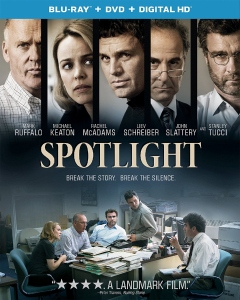“Spotlight” almost brought tears to my eyes with the way it respectfully portrays the Boston Globe’s 2001-02 investigation into the Boston Catholic church’s systemic sexual abuse of children by its priests. In the vein of “All the President’s Men” and “Zodiac,” “Spotlight” is a procedural about the down-and-dirty details of investigative newspaper work, and it might be the most pitch-perfect of them all. It’s directed by Tom McCarthy and written by McCarthy and Josh Singer; the latter also penned the similarly themed “The Fifth Estate,” but “Spotlight” is much more focused and engrossing.
I hung on every moment of the film, and I think most viewers will too, although my interest in the topic might be more acute than most. Although I work in journalism, I’ve never worked at a paper large enough to have a Spotlight team such as the Globe’s (played by Michael Keaton, Mark Ruffalo, Rachel McAdams and Brian D’arcy James). “Spotlight” is about the way this story started with a seemingly inconsequential brief buried on the Metro page and gradually grew into a story that was prominent in the local, national and international news cycle for several years – and forever reshaped the way we view the Catholic Church.
In addition to the all-star cast (which also includes Liev Schreiber, John Slattery and Stanley Tucci), the details of “Spotlight” are exquisite. For example, it shows that both institutional knowledge and an outsider’s perspective are key. The story wouldn’t have grown beyond the Metro page if not for it sparking the interest of new editor-in-chief Marty Baron (Schreiber). But at the same time, the fact that Mike (Ruffalo) is Boston-bred is crucial in getting abuse victims to open up with their stories. We also see Sacha (McAdams) play up her local status – she’s from Ohio, but her family has Southie roots – to make subjects comfortable with her.
But there’s a flip side: Spotlight editor Robby (Keaton) is a lapsed Catholic who remains friends with some of the priests, lawyers and officials. Will that play into his decisions about how to approach the story? “Spotlight” presents the four reporters like dyed-in-the-wool professionals, but also as human beings. Mike’s apartment is a dump, Rachel is bringing her work home with her, and Matt (James) is concerned about an ex-priest who lives in his neighborhood. In the end, it comes off as a fair – rather than glowing — portrayal of how newspaper folks operate, for better or worse, and that’s what a journalist would want.
If there is one downside to “Spotlight,” it’s that there are equally fascinating stories playing at the margins, but it’s not within the film’s scope to go there. In one fascinating scene, a priest, without a trace of shame, tells Sacha he molested children, which ties into a psychologist’s theory that some of the abusers are emotionally stunted from having been part of the abuse cycle themselves. However, “Spotlight” is about the fact of the abuse, not the “why” or “how” – for those, you’ll have to read the Globe stories.

And wider issues of the newspaper industry are only touched upon. In their first meeting, Marty tells Robby that there will probably be staff cuts under his regime, but that issue isn’t brought up again. Presumably, the church story achieved Marty’s goal of making the Globe essential to readers’ lives, at least for a while, meaning there’s a bit of a business success subtext playing under the text.
Still, 14 years later – although the goal of putting out an essential product is certainly still valid – the fiscal troubles of newspapers (which are being cannibalized because readers are shifting to the web and online ads don’t draw nearly as much revenue as print ads) means the era of investigative journalism is nearly dead.
“Spotlight” isn’t sentimental, but to me it played somewhat like a love letter to an old art form by chronicling one last achievement at the turn of the century. The Spotlight team works out of a basement office – albeit a better-lit one — like Mulder’s in “The X-Files.” A Globe receptionist gathers up clippings from the archives and the team reads the actual clippings (as in “clipped out of the newspaper”). The reporters scribble in Reporter’s Notebooks; I don’t think a tape recorder appears in the movie. And Mike in particular does a lot of physical legwork (which, admittedly, is still done to this day when it comes to tracking down government documents). That having been said, we don’t get any really mundane details like computer crashes and other technical glitches that put speed bumps on a reporter’s duties; in that sense, “Spotlight” might be romanticized, or perhaps big papers just have excellent tech support.
In the only scene that plays false, Mike has to rush back from Florida (where he had been dispatched to cover a 9/11-related story about flight schools) to pick up some documents in Boston. It’s not made clear why another team member couldn’t have taken up that task.
There will still be great movies down the road chronicling the uncovering of ethical and legal crimes by powerful institutions – previews before my screening of “Spotlight” included “Concussion,” which takes on the NFL, and “Snowden,” which of course takes on the most entrenched institution of them all, the U.S. federal government. But in terms of a specific newspaper team digging up a big and sweeping story, “Spotlight” illuminates a wonderful era just before it goes dark.

